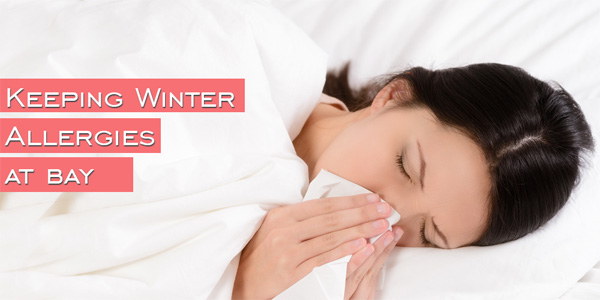Amongst all seasons, winter is the most awaited & enjoyable period of the year but this is also the time when illnesses, infections & allergies are at their peak. Fever, runny nose, itchy/red/ watery eyes, sneezing, wheezing and sore throat are very common during misty weather. If you think that you’ll be safe by staying indoors, then you are sadly mistaken. Many indoor allergens like mould, house dust mites, animal dander and perfumes are known to trigger allergies that can easily have a negative impact on your health. Seasonal pollens that permeate the air (when temperature drops) are largely responsible for most people falling sick in winter. It’s absolutely impossible to protect ourselves from coming in contact with these pollens. What we can do is, build a strong immune system by making the right food choices (seasonal fruits &vegetables, milk and protein rich food) in winter. Apart from this, there are a few precautionary measures that could also protect you from winter allergies:
- During winter, most people keep their doors & windows shut in order to avoid cold winds but doing so allows the indoor air pollutants to swirl around our homes and become twice as concentrated. We hear a lot of coughing & sneezing in many households and a chilly weather is not the only one to be blamed for it – allergens are too.
- Keep your home clean, hygienic & dirt-free. Wash all bed sheets, pillow covers, table cloths etc. at least once a week in order to keep dust mites away. If you are allergic to dust, wear a mask or cover your nose with a clean cloth while dusting, cleaning and/or vacuuming. This will decrease your exposure to dust and other airborne pollutants. Sufficient ventilation within your home can also prevent growth of moulds
- If you have pets at home, vacuum the furniture, carpet and floor on a daily basis. Give them a bath at least once a week. It is best not to allow them to climb on the bed.
- If you are using a room heater, make sure to replace its furnace filter so as to In order to improve the indoor air quality
- Do not smoke indoors especially if there is no ventilation within the room. Remember, being in close proximity of smokers can easily aggravate coughing and breathing problems in those who are sensitive to winter allergies. Sometimes, Agarbatti smoke can also act as a trigger. It is best to maintain a minimum level of humidity in your home. You can prevent growth of dust mites with the help of a humidifier and dehumidifier
- Get rid of mold spores. They are basically fungus that normally dwells in damp and humid places like bathrooms and kitchen sink. Keep a close watch to check if there is any kind of mold breeding in different spots within your home
- Regardless of the season, extreme exposure to sun rays is always harmful to your skin. Rashes and skin allergies are common during winter too. Ward off the harmful effects of UV rays by using a good quality sunscreen before stepping outdoors.
- Eat the right food. Green tea is known to have an excellent impact on health when consumed in winter. Similarly, certain foods like cucumber, ice-cream, bananas, cheese, yoghurt etc. have a reputation of causing an allergic reaction in many, especially for those suffering from asthma problem. Food items that are rich in Omega-3 fatty acids and antioxidants protect your immune system and keep you away from allergies. Also keep yourself adequately hydrated and take plenty of rest.
No matter what season it is, you must never ignore allergies. If you have suddenly developed dark circles under the eyes, runny nose, constant sneezing, itchy & watery eyes, it could be an allergic reaction. Schedule at check-up at your nearest medical facility and start the treatment at the earliest.
Kokilaben Dhirubhai Ambani Hospital offers a broad range of services including diagnosis, treatment and management of all kinds of illnesses. To know more, visit: https://www.kokilabenhospital.com


